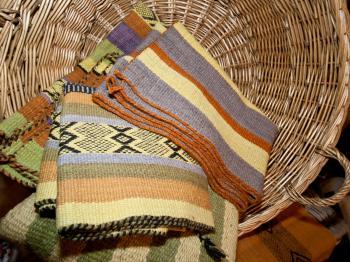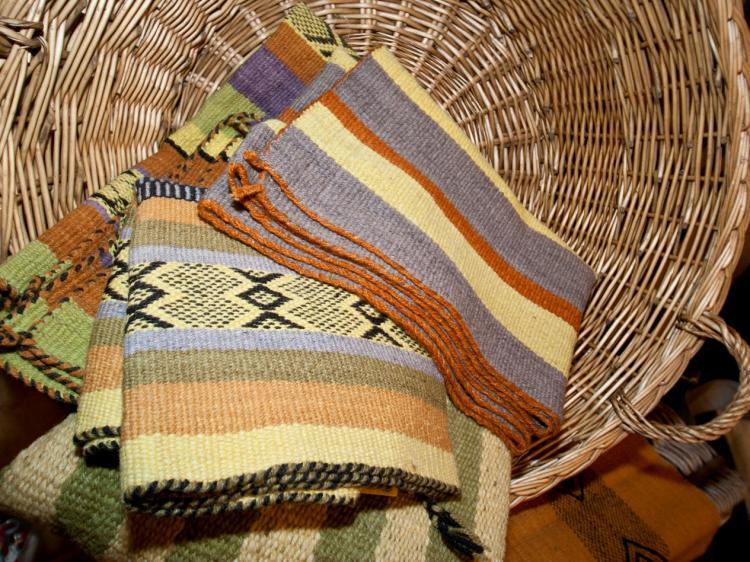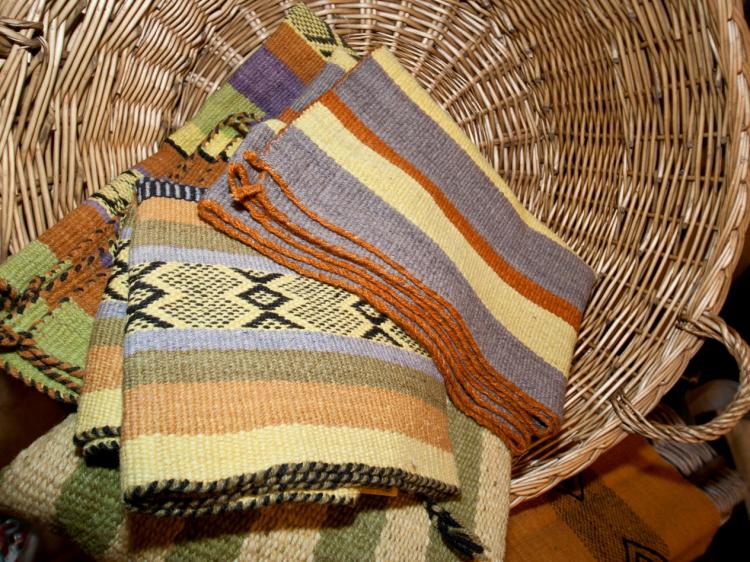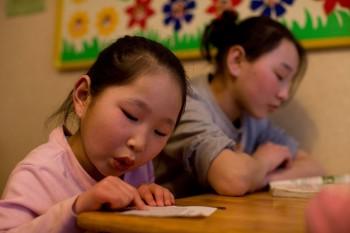WOODSIDE, Calif.— On Saturday evening, Oct. 9, in Woodside, Calif., the Chol-Chol Foundation displayed woolen clothing and home décor items hand-woven by the indigenous Mapuche people of southern Chile. The handmade goods are sold to urban markets through a co-op.
The display was held at the Emily Joubert Home & Garden shop. During the event, the foundation’s design director, Jasmine E. Aarons, talked with guests about the products, the artisans, and the foundation. Ms. Timmie Jensen, a member of the Chol-Chol board, told about the foundation’s work.
When the foundation was established in 1971, it helped farmers and planted trees to fight poverty among the Mapuche people. But there was no money coming in for the farmers, and the foundation realized that the weaving the women did had the potential to support the community. So they set up one of the first co-operatives to use fair trade principles.
[etssp 133]Besides creating a self-sustaining local economy, the foundation also set the goal of preserving the traditional culture. The weaving project helped this goal by enabling the women to stay in the villages and follow traditional weaving practices instead of having to migrate to the cities to work as maids.
A museum close to the Mapuche region, in the Chilean city of Temuco, demonstrates the traditional crafts and helps preserve the culture. The region now has an elementary school, which helps solve the continuing problem of access to education.
Another goal of the foundation is to promote the idea of fair trade, making it accessible and desirable to mainstream shoppers.
The project evolved as the directors realized they needed a cultural bridge to connect rural workers and their traditional products with urban consumers who would feel great supporting traditional crafts if the products were appealing to them. Jasmine Aarons joined the project to take on the challenge of bridging that cultural gap.
Jasmine earned a B.S. degree from Stanford in Mechanical Engineering integrated with art and psychology. She had encountered the Mapuche when she was on a study trip in Chile.
When she gave a proposal to collaborate with the co-op, she said, she brought in an ad from Vogue showing a model wearing a bulky sweater. She showed it to the organizers to demonstrate her idea of bringing their products to the mainstream U.S. buyers. She helped them make the transition psychologically, to realize that their products could appeal to a broader market and to modern shoppers.
She told them, “Your articles are much nicer than this picture!” The idea fell on fertile ground—the women liked what she was suggesting.
“If you believe in someone and trust them, they will blossom. That’s what we did with these women,” Jasmine said. “It has to be through the heart of the community.”
As she promotes their products, she sends feedback. “Now we send them photos of their work being sold in fairs and stores, and they can see their products on Facebook—they can see the people’s appreciation,” Jasmine reported.
As the designer, Jasmine takes a product and develops it to get it in to production. To appeal to the U.S. mainstream market, she has designed some belts and some woolen scarves with large buttons with a more au courant look, moving away from the strictly traditional.
Continued on the next page...
She said her work is about the product and the process, not about a flashy design. “It should be elegant enough to get access to the market, but it is all about the weaving. The design should be simple and focus on the craftwork, making it accessible,” she explained.
She pointed out that the Mapuche area in Chile is still a third-world region, but the people can’t look to the charity model to help them. They are developing business partners to work with them, setting up a manager in their community, learning business skills, and rising above the lack of both education and opportunity.
Jasmine said, “This project shows how very smart the women are.” She feels it is incredible to be an enabler for this initiative. She comments that it’s wonderful to see, bringing products with a thousand years of heritage to a new market, and all of it comes from sustainably sourced materials.
The Products
Mapuche textiles are naturally dyed, hand-spun, and hand-woven. They include scarves and ruanas, hand-knitted ponchos, and hand-woven household items—placemats, hot pads, bedspreads, and pillows.
The colors might be labeled “earth tones,” but they don’t have that flat, muted aspect of earth and clay and stone. These colors are alive and are beautiful tones with a depth that reminds one of beautiful hair. The highlights and deep shades draw in the viewer.
The women create the items using traditions a thousand years old and wool from sheep raised traditionally and sustainably. The foundation’s management in Chile oversees the quality and represents the artisans. The compensation paid for the items follows the fair trade principles.
The website, cholchol.org, states their support for that spirit: “Fair Trade invites peace and development. As consumers we have the power to contribute to reducing poverty and protecting the environment. We can do so by supporting the Fair Trade movement.”
The mission of the foundation, to encourage fair trade shopping, is succeeding, according to Jasmine. “People in California are becoming inspired.”
In Woodside, the retail store that held the show, Emily Joubert Home & Garden, now sells the Chol-Chol items. And Jasmine told of a local Woodside spiritual center that ordered blankets from Chol-Chol because they care about how the blankets they use are made and where they come from.
At the event on Saturday night, some of the ladies who are yoga students at the center came by and told Jasmine that they have been studying the symbols on their blankets.
The Future
The foundation is moving from selling the textiles at craft fairs to selling in mainstream boutiques and places like the Emily Joubert Home & Garden shop. In this way, they are reaching out to inspire more customers to buy fair trade goods.
The co-op now employs 30 quality artisans to fill the orders, and they have in mind to employ 300 experts by the end of the year. They are also currently holding design workshops.






